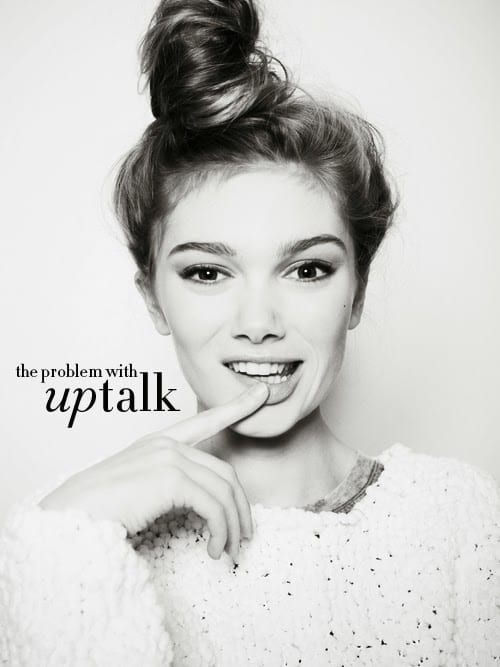I really don’t like listening to videos of me speaking. And it’s not just because I think my voice sounds differently in my head. It’s because I use verbal crutches… a lot of verbal crutches. The “likes,” the “ums,” and the “uhhhs” are really bad. Another thing I’ve picked up and realized that I’m doing? Exactly what Maxie is about to describe!! I find myself doing this all the time and know I need to (and try to) stop.
*****
If someone asked us what we wanted to be when we grew up, our elementary school answers probably included doctors, lawyers, politicians and musicians (and maybe a dolphin trainer here or there!). But I think I can confidently say none of you ever told your parents you wanted to be a Valley Girl one day… You know, the girl that sounds a bit aloof, unsure of her own opinions and thoughts on a matter. That’s putting it nicely.
But yet so many of us all sound like that. And it’s not for the reason you might think.
You’re probably thinking to yourself, what does Maxie know? I speak confidently. I share my ideas. I’m intentional in the way I communicate. I don’t even remotely resemble a Valley Girl.
You may be right. You may do all of those things. I thought I was an impeccable communicator too, until I learned about a habit sweeping our generation undermining our leadership abilities from the time we open our mouth: uptalk.
Uptalk is a pattern of speech that all of you have heard and most of you have used whether you knew it or not. It’s when you gradually rise in sound towards the end of sentence. There’s higher inflection at the end of your statement than there was at the beginning. Meaning everything you say ends up sounding like a question.
It’s a verbal tic that is literally spreading like wildfire among the 35 and younger age group, men and women alike. And once you start it’s difficult to stop. I’ll never forget the first time I heard someone using uptalk. Years ago, I noticed a girl I was working with always ending her sentences (normal, declarative ones) in what sounded to me like a question. She and I spent a lot of time together, and before I knew it I was doing it, too. I noticed that I was speaking similar to the way she spoke, but that’s happened to me all my life. I’ll naturally pick up on verbal patterns of the people closest to me without even realizing it. However, I wish someone had told me how undermining my new habit was.
Years went by before I ever learned the negative effects of this new verbal habit. Until reading one of my favorite leadership books, I had no idea that as I was using uptalk, I was simultaneously casting a blanket of doubt on the ears of anyone listening. I was undermining my credibility simply with the way I sounded.
That’s what uptalk does. When you rise with the final tone of your sentence, it makes it seem like you’re checking in with the person listening as if to say “does that make sense to you?”. You come across as unsure, informal, not confident and wavering.
Crazy right? Especially since so many of us do this. I guarantee that when you listen to your group of girlfriends at your next wine night, you’re bound to hear one of them doing it or even do it yourself. But now’s the time to fix that.
Verbal patterns are a b*itch to try and fix. It’s like attempting to stop saying um. You have to first recognize that you or those around you are doing it so that you’re more sensitive to catching yourself. It’s kind of like when you buy a red fiat, suddenly everywhere you go you see your exact car. Pretty soon uptalk will be that red fiat.
Once you recognize your Valley Girl pattern, you just have to start visualizing every sentence ending in a period. If you slip into the uptone, follow it with a phrase that lands lower.
While it may seem like a silly thing to worry about, paying attention to the way we communicate can help us move mountains. While ending your sentences with questions may not seem like such a big deal over wine with your galpals, during that interview process or big presentation on the other hand…the last thing you want to seem is unsure. So let’s knock out this valley girl pattern both for ourselves and those around us. Our future success is hinging on it!
xoxo









This is SO interesting! I realized just this weekend that I do this, and I'm so glad I'm not the only one with the bad habit! Definitely going to try and cut it now.
This is SO interesting! I realized just this weekend that I do this, and I'm so glad I'm not the only one with the bad habit! Definitely going to try and cut it now.
Love this!! I do a ton of public speaking and events for clubs and organizations at my high school, and this advice is super useful. I never even realized there was a thing called "uptalk"… But now that I know I'm pretty sure that myself and my friends do it all the time haha time to fix another bad habit!
xoxo
thebouquineuse.blogspot.com
I also think another big problem is the whole "I don't care" tone of voice girls are using these days! I think it's called vocal fry–but it makes the voice all scratchy and honestly drives me crazy!
lachatonettecafeinee.wordpress.com
I am so glad someone mentioned this because I've been noticing it in people for years now, and it's absolutely one of my pet peeves. It's interesting to mention that I am not an English native speaker, and in my culture I do not notice this phenomenon. That is why I was able to notice this occurrence once I became more aware of the linguistics of my language and English. I did learn English in the US from an early age, and I did at first notice I have a tendency to speak with uptalk- I picked it up along with the language, mostly from TV, because growing up in not so affluent neighborhoods of NYC and the public schools here, it's not something I notice many native NYC residents do. When I became more conscious about how it differs from my native tongue, I decided to stop it immediately. I've read somewhere that women are more likely to engage in this type of talk, and that it hurts us in the workplace because it makes us seem less competent, as if we're not sure of our ideas. I think that's true, but I have to say I notice a lot of men speak with that type of intonation. I hope more people realize that this pattern of speaking is awful so that I am not tempted to say for example, "are you telling me you're from Ohio, or are you asking me if you're from there?"
OH. There's nothing that bothers me more than the Valley Girl talking. I tend to ignore and have become immune, but it is oh so attention grabbing (not in the positive way).
My crutch is usually "AND." I'll never finish one sentence and keep on saying and…
Your Friend, Jess
Love that you share advice like this for young professionals. I am definitely guilty of uptalk (my husband hates this), as well as most of this list: http://www.refinery29.com/2013/10/55289/uptalk-communication-mistakes
Being strong and direct is always a struggle for me!
Oh my gosh, after I spent a lengthy amount of time in the US and came back home to England, my dad kept on having to correct my way of speaking! I didn't even know that I had uptalk — it's infectious! Great post… and I absolutely love your blog! You're a big inspiration! x
I know exactly what you are talking about. I hate when I use the work "like" as a filler word or start saying "um" to take up time to think. This post was really interesting to read.
Lauren,
http://www.atouchofsoutherngrace.com/
I know that I do that because a friend of my told me that. I try to stop, but I forget that I am supposed to stop. Now I know the term for it. I have no idea where I picked it up.
This is something my Dad instilled in me from when I was very young. Also, a very wise professor once said.." say what you have to say, Loudly and Confidently" which goes right along with getting "uptalk" out of your vocal cues. Its hard to have uptalk, when you speak up and speak it WITH confidence not like you're trying to pretend that you have confidence.
Great blog! i'm glad you posted about this issue. I work in higher education and I hear the uptalk in girls constantly. it sounds ridiculous and they have no idea. In a public speaking course, a professor once said we were supposed to pretend we were ending each sentence one level down. the last word should always be the last word; your voice should go down, not up.
Something almost as prominent as uptalk among young women is the use of the word "literally."
"It’s a verbal tic that is literally spreading like wildfire among the 35 and younger age group, men and women alike."
I think we have the Kardashians to thank for this one…literally Kim you are so rude
I'm going to be the lone voice of dissent and say that this may have less to do with "uptalk" being a problem and is more about how we discount traditionally feminine ways of working. This Slate article elaborates on that more eloquently than I ever could: http://www.slate.com/blogs/xx_factor/2012/02/28/upspeak_vocal_fry_in_defense_of_female_ways_of_speaking.html